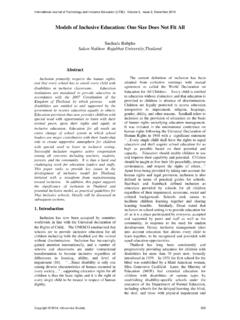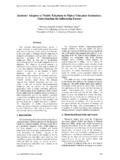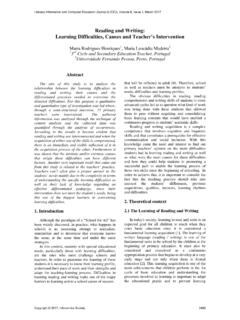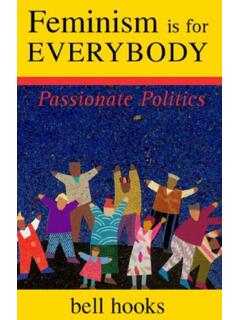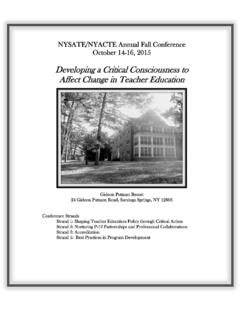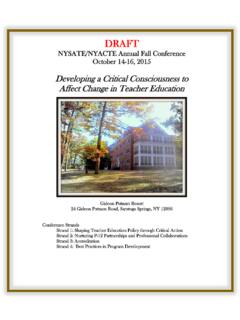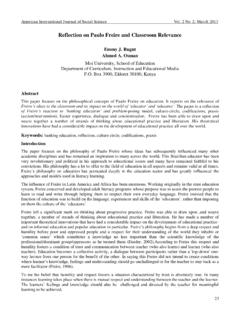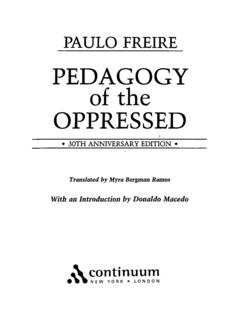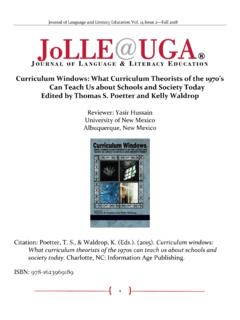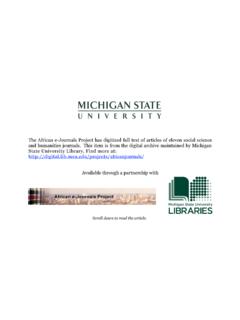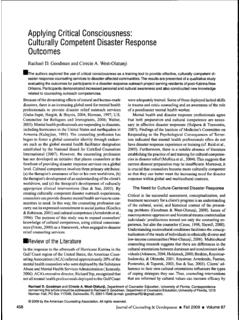Transcription of The Critical Epistemology of Paulo Freire - Infonomics Society
1 The Critical Epistemology of Paulo Freire James M. Czank Lakehead University, Canada Abstract My paper is an exploration of the notion of Critical consciousness in Freire s philosophy of praxis. The underlying so what? for this paper is what Freire recognized as the problem of people only absorbing the substance of his philosophy to a certain degree, resulting in a definitive movement away from a Critical embracement of change and an assumption of positions that he considered anti-Freirean in nature [1]. Another, and not unrelated, reason for a paper such as this is what McLaren heralds as contemporary revisionism, which, he maintains, antiseptically excises the corporeal force from Freire s practice through the diversification of its Marxist elements [2].
2 McLaren attributes this to the post times we live under, which places under suspicion master narratives, universalism, and objectivity [3]. The importance of this paper lay in the light it sheds on Freire s epistemological commitments, and the query it raises about the nature of his philosophy. I also include a brief exegesis of the philosophy of Freire . 1. Introduction It was Freire s conviction that the world could be a less ugly, less discriminatory, less dehumanizing, and more beautiful, more democratic, and a more humane place, which first endeared the man and his writing to me. And it was the following passage from his education for Critical consciousness : The more accurately men [sic] grasp true causality, the more Critical their understanding of reality will Critical consciousness always submits that causality to analysis; what is true today may not be so tomorrow.
3 Na ve consciousness sees causality as a static, established fact, and thus is deceived in its perception. [4] ..that got me wondering about the nature of his philosophy, since it does not really fit with the dialectical materialism that, I have been told, defines Freire . My investigation confirmed what I already knew about Freire , that his philosophy is indivisible from history, dialecticism, and the world. It also turned up a little something about the scholarship surrounding the man and his ideas; it seems that a great deal of the scholarship, coming from people like Ronald Glass [5], Peter McLaren [6] [7] [8], and Wayne Au [9], is about the dialectical materialism of Freire . I also had the incongruity of his Epistemology addressed.
4 According to Carlos Alberto Torres, to understand Freire one needs to appreciate how he uses two different but linked lines of theoretical development: One is the dialectical perspective that emphasizes the histories of individuals and structures in the production of the material and symbolic layers of human life, id est dialectical materialism; and the other is his ever evolving theory of Critical agency [10], expressed in passages like the one that set me upon this investigation, and in statements like: [ Critical consciousness ] enrolls [people] in the search for the awakening of Critical consciousness leads the way to the expression of social discontents precisely because these discontents are real components of an oppressive situation.
5 [11] I found Torres identification of the different lines of theoretical development validating, as it confirms that Freire s philosophy extends beyond the idea and label of dialectical materialism. In fact, further investigation showed that Critical consciousness cannot be reduced to a chronological conversion of consciousness at all [12].. nor, to paraphrase Freire , can it be reduced to a shadow of his materialism [13]. So what is this element of Critical consciousness ? 2. Analysis Freire believed consciousness to be something involved both in and with the world. This notion of existing in the world suggests a fairly standard individual and determinate view of consciousness . Existing with the world rounds the idea of consciousness out.
6 With is plural in nature wherein consciousness is organized in necessitudinem. Freire treats consciousness in much the same manner as Hegel and Marx treated it, as a third person reflexsive pronoun, as something neutral that covers all genders. In and with is how Freire describes consciousness ; consciousness , Literacy Information and Computer education Journal (LICEJ), Volume 3, Issue 4, December 2012 Copyright 2012, Infonomics Society801 for Freire , is our relating to the world in a meaningful way. Freire defines Critical consciousness as analysis and as a rigorous reading of the world; or, as he explains [a] way to understand better the problem of interests [and] the questions of power.
7 How to get power [and] what it means not to have power. Finally, [it] implies a deeper reading of reality, [and that] common sense goes beyond the common sense. [14] It is to bring an element of understanding to the in and with that is his notion of consciousness . Like dialectical materialism, Critical consciousness has to do with the relationship between subject and object; but it also has to do with self- consciousness , the relationship between the theoretical and the practical, and it constitutes the link between ego and desire that fueled Freire s struggle of and for the oppressed [15]. Its standpoint, as something distinct from but linked to dialectical materialism, is the relation individuals have to the rest of the world as an engaged consciousness , accorded to a notion of dialectics, dialogue, and praxis.
8 The idea of engagement is crucial to Freire s notion of Critical consciousness , as it is how he believes we create reality and are able to add to the world in an authentic way [16] how we keep it real. As such, I appreciate Torres reference to a Critical theory of agency (rather than consciousness ) in describing the two lines of Freire s theoretical development, because agency emphasizes a level of engagement not typically associated with consciousness , which is fundamental to Freire s stance. For Freire , the idea of Critical consciousness arises as an antinomy in understanding to, what he calls, na ve consciousness and magical consciousness . The latter of these two, id est magical consciousness1, represents a failure to appreciate causality, or as Freire explains it, the failure to recognize our agency in the world [17].
9 It is a categorization of those who adapt themselves defenselessly and passively to the expectations of a superior force, people who accept life for what it is and do not question the injustices done to them [18]. It is also to treat human awareness as an empty space waiting for content thus begging the question of whose content, and on behalf of whom, against whom, and in favor of what, and against what [19]; remember that, according to Freire , neutrality is a myth. Magical consciousness is a representation of 1 I know of at least one popular educator who refers to magical consciousness as a fatalistic consciousness because he recognizes the problematic ethic stemming from Freire s ethos of Catholicism.
10 The silent, docile, adaptive and passive position Freire was so opposed to, characterized by the sort of fatalism that leads people to fold their arms, resigned to the impossibility of resisting power [20]. It is the sort of fatalism that leaves no place for utopia [21]. The other of Freire s antinomies concerns na ve consciousness ; the opposite of the fatalism I just described, Freire uses it as a categorization of those who believe themselves superior to their reality, in control of it, and thus free to understand it as they please. It is the belief that one can superimpose oneself upon the world, instead of understanding oneself as part of it [22]. Freire does not give a lot of explicit context for this, but he does refer to Hegel a lot, thus I feel justified in turning to Hegel myself.
